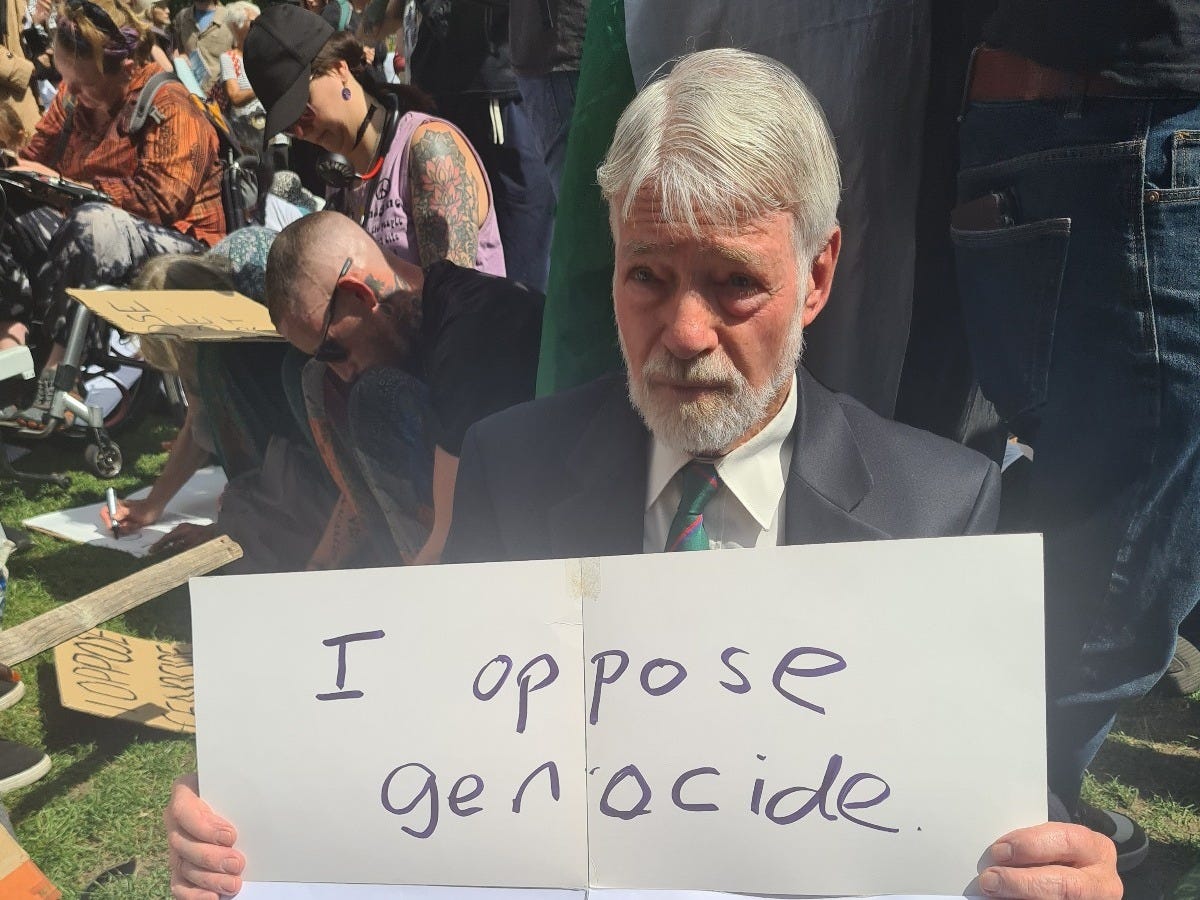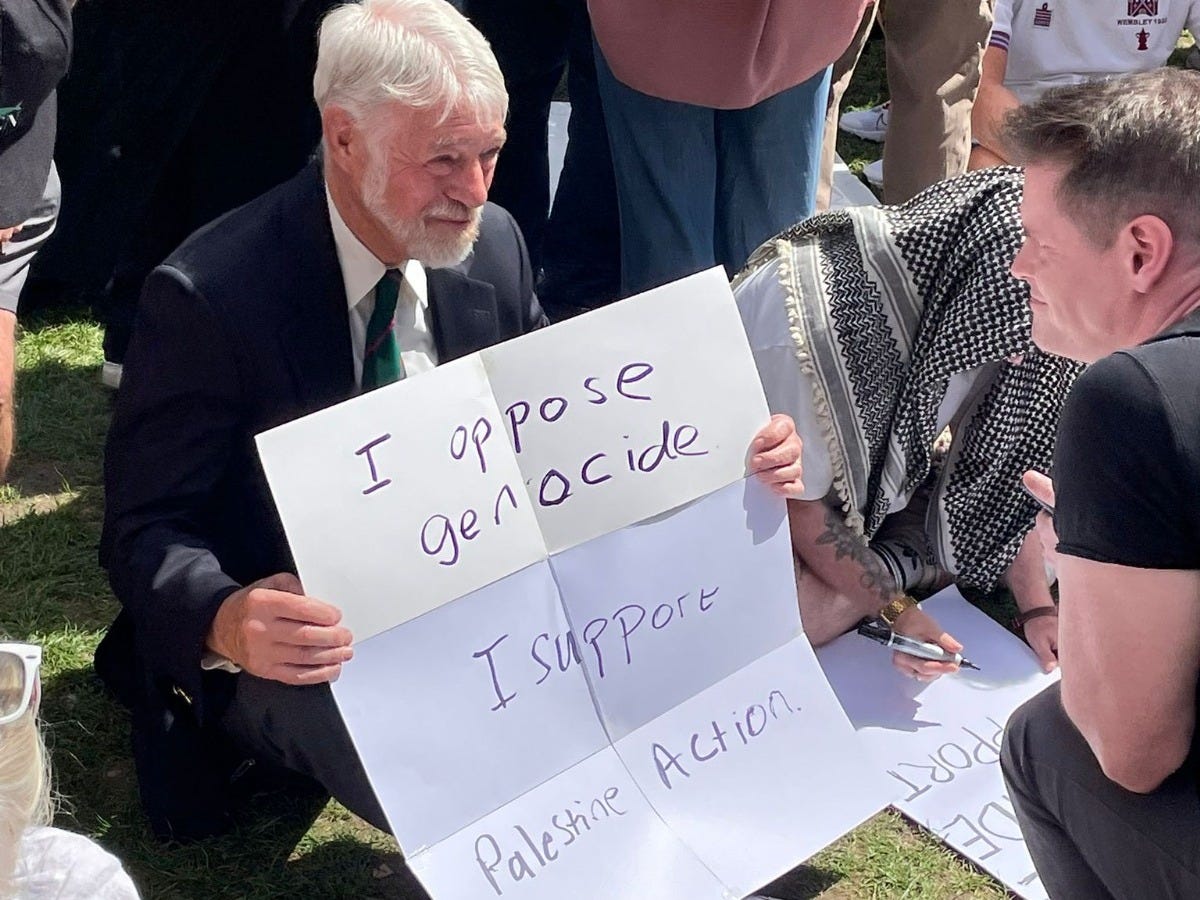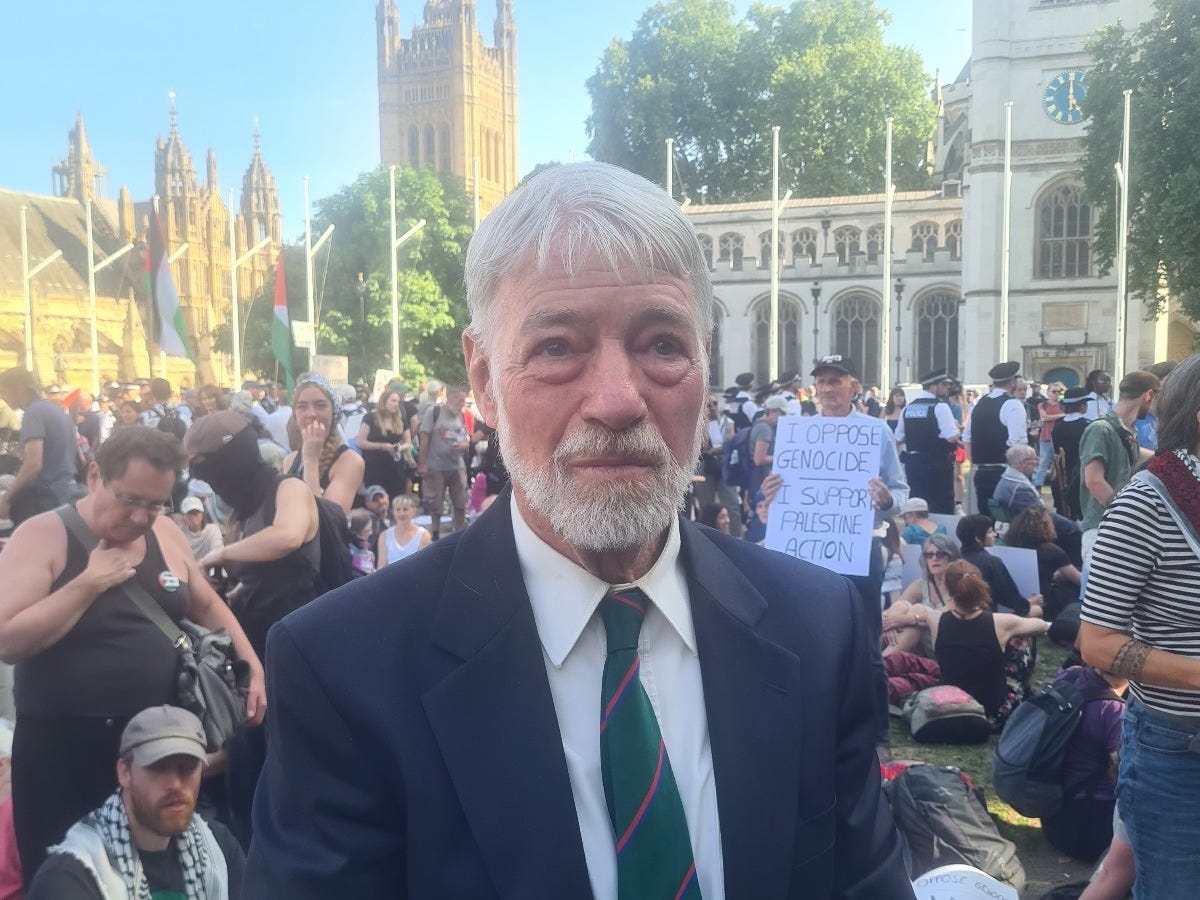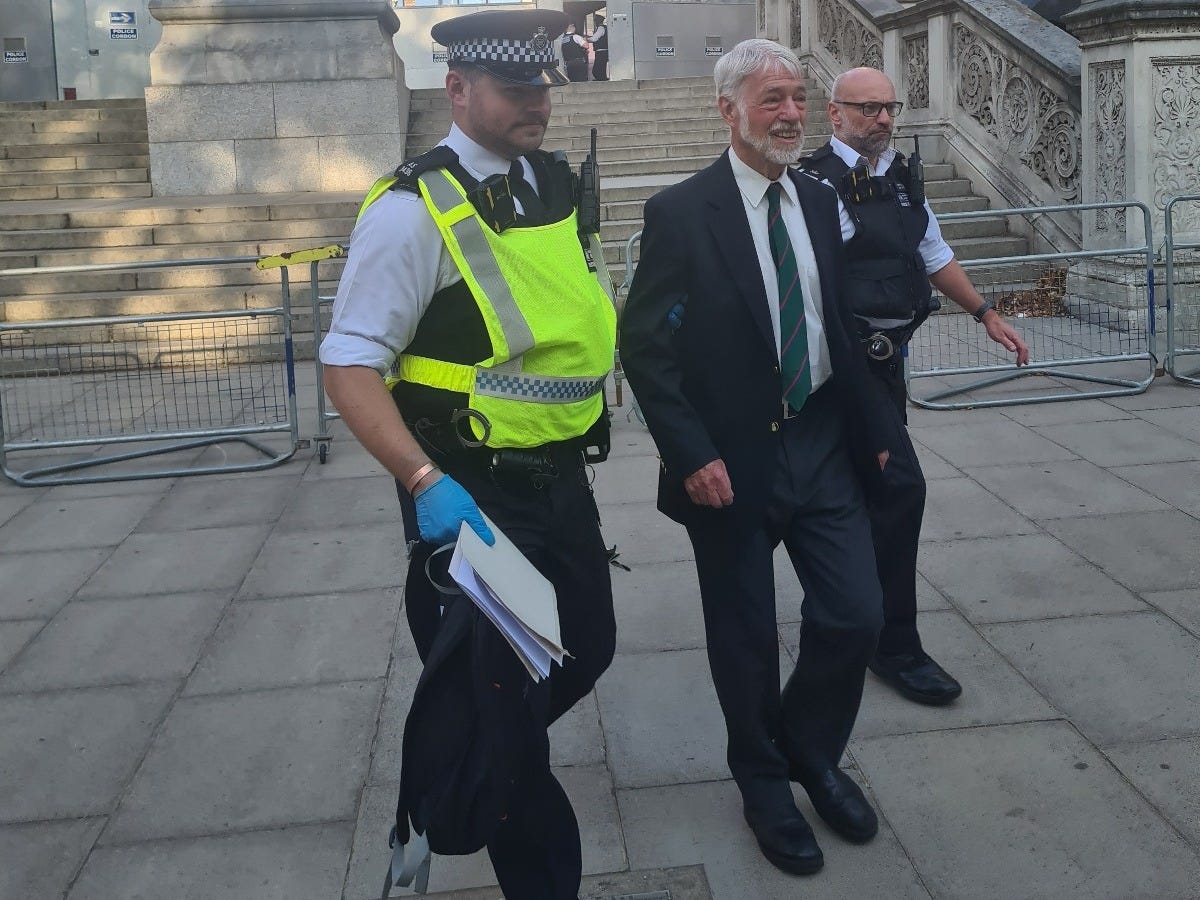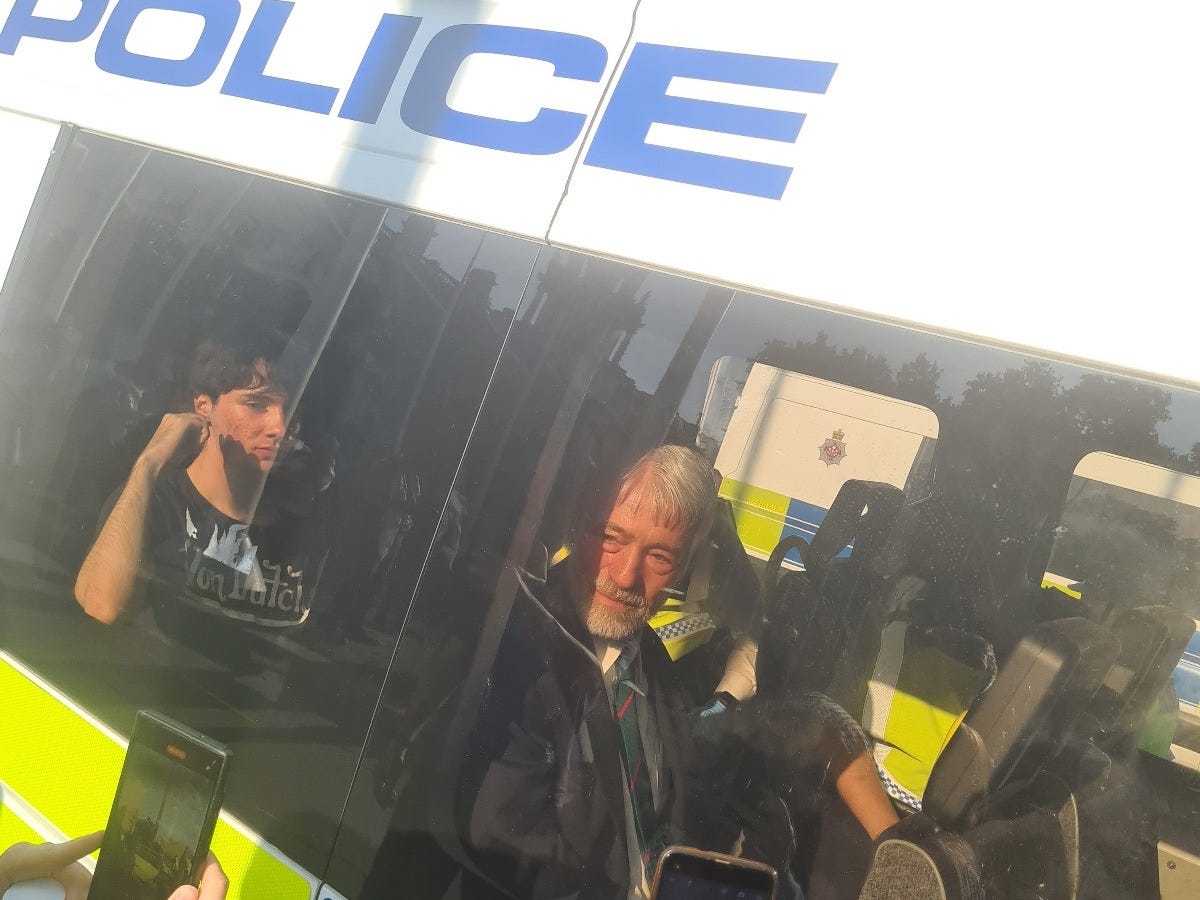Ex-Army Colonel Arrested at Gaza Protest: ‘Holding a Cardboard Sign Is Not Terrorism’
Retired colonel Chris Romberg, 75, tells Josiah Mortimer that the Government is criminalising peaceful dissent after being arrested under anti-terror laws at Palestine Action demonstration
Colonel Chris Romberg was in the army for 33 years and was formerly defence attaché in Egypt and Jordan. He is the son of a Holocaust survivor. His family – father, grandparents and aunts – were forced to flee Austria in 1938 after the German annexation, as they were of Jewish descent.
Josiah Mortimer: What happened on Saturday?
Colonel Romberg: The police set up a temporary facility in King Charles Street where they processed almost everybody, and this was effectively like us being in the police station. They took our details, made us identify ourselves, took down our details, and then released us on bail.
Josiah Mortimer: What are the bail conditions for you and maybe others?
Colonel Romberg: It is not to attend any planned or unplanned protest, spontaneous or otherwise in support of Palestine Action. I imagine those are standard for just about everybody, because they had been pre-printed into the form.
Josiah Mortimer: Is this the first time that you've been arrested?
Colonel Romberg: Yes, it is the first time I've been arrested.
Josiah Mortimer: Just tell me about what brought you to get involved in this.
Colonel Romberg: Including my reservist service, I was 33 years in the Army. 29 as a regular, and I left in 2007. I was in 29 Commando Regiment. That was my last regimental service. My last two jobs were as defence attaché in two countries – Egypt and Jordan.
Josiah Mortimer: So it's quite a big thing for you to take part in – for a former Army officer, Colonel and attaché to take part in a protest which the Government alleges is supporting what is classed as a terrorist group. You must feel quite strongly about this.
Colonel Romberg: I do feel strongly. I feel very strongly about what is happening in Palestine. I've had a long interest in the Middle East and in the issue of Palestine, and since leaving the Army, I've been able to be an activist on that.
What I saw in my last two appointments in the Middle East, in Egypt and Jordan, from which I was also able to visit other countries, including Israel and those territories that it occupies – this has really led me to take major interest, and I'm appalled at the genocide that is currently taking place there in Gaza, and also what's going on in the West Bank and in the neighbouring countries.
Josiah Mortimer: You spent time in Gaza and the West Bank, tell me about that.
Colonel Romberg: I didn’t spend a long time there, but I was able to visit them officially and see what's going on there then, and that was in the early 2000s. Obviously what's going on now is far, far worse. For that reason, I was keen to take action, because this protest on Saturday was related to an organisation that was opposing the genocide in Palestine.
Josiah Mortimer: Would you say this for you is more of a free speech issue in the sense that Palestine Action has been banned and you disagree with that, or more about actually supporting PA in the sense of their tactics and aims?
Colonel Romberg: It's an issue with opposition to the genocide that is my prime focus, and putting pressure on the Government to live up to its obligations to prevent genocide, which it signed up to internationally – its legal and moral obligations. The free speech issue and the issue of the overreach in terms of anti-terrorist legislation is related to that.
Josiah Mortimer: At the Number 10 lobby briefing yesterday, they seem to be making a lot of the idea that they have top secret information that shows Palestine Action is a much more sinister organisation, and is actually a violent group. What do you make of that? But as a former military man, how does that come across to you?
Colonel Romberg: Obviously I'm not privy to any information that they claim to have. But I feel it's all too easy to start claiming national security, claiming you have secret information, slightly frivolously.
Years ago, Monty Python did a sketch about gangsters called the Piranha Brothers, and one of the characters in this had his head nailed to a coffee table by the Piranha Brothers. When asked why, he said, "Oh, they said I'd broken the unwritten law." They said, "What was it?" "I don't know. They wouldn't tell me."
We feel the Government is getting to this sort of situation. In the court case, they also produced supposed evidence, for which everybody had to leave the court and neither the claimants nor their lawyers were allowed to know what it was, or even be present, and this was then put before the judge without any dynamic. This sounds like what we would normally expect from an absolute dictatorship.
Josiah Mortimer: What do you think has driven the Government to do this? It felt, at the time, quite remarkable, coming from a Labour Government.
Colonel Romberg: In many Western European countries, and the United States and elsewhere – great efforts are being made to suppress any movements that are supporting the Palestinian people against their genocide, and I've witnessed this myself with other European countries as well.
If any movement raises the profile of this, they're doing their best to suppress them by statements, by propaganda, by smearing, by legal measures, bannings, the use of strong police power. This is part of this pattern.
Josiah Mortimer: The Government is watching intently the state of these protests. Do you feel that they will start to shift – that this extended civil disobedience activism will make them back down? Or do you feel that you're bashing your head against the Government?
Colonel Romberg: The Government clearly feels under pressure and wants to appear strong, but really this is a sign of their weakness. They want to appear that they can stand up to this pressure, and I'm sure they will try and hold out, but they are, in many ways, making themselves look ridiculous.
As others have pointed out, of those who were arrested as terrorists on Saturday – about half of them were pensioners…You had disabled people in wheelchairs. You had somebody who was disabled in a wheelchair and blind. Right next to me, an 89-year-old woman was arrested and carried off. Are these really the terrorists that the Government is supposed to be fighting? This may continue, more people will join. People are seeing this not as a determined movement by the Government to stop terrorists, but as criminalising pensioners.
Josiah Mortimer: What were your interactions with the police actually like on the day? Did you feel that their hearts were in it? How were you treated?
Colonel Romberg: I felt that the police on the ground, who were clearly under orders and have been told to do this, generally behaved very decently. Some of them clearly didn't really feel that this was what they should be doing.
It was a huge operation for the police. They had to get reinforcements from various different parts of the country. They conducted it peacefully. They generally treated people well. One or two exceptions. Next to me, one young person was handcuffed at one stage, which was completely unnecessary – sitting on the ground and waiting to be arrested. I didn't think that was right. There were one or two little scuffles. We had some pro-Zionist counter demonstrators who were allowed by the police, or at least not prevented by the police, from coming in and actually being in the middle of the protest, which I don't think was good practice.
On the whole, the police have been keeping counter demonstrators away from main demonstrations, and this led to some scuffles, but there was no real violence at all.
People were packed close together in a very small area, and there wasn't any violence. the behaviour of the police towards us – because they recognised who they were dealing with – the behaviour of the police was very restrained and generally even good humoured. Sometimes they seemed slightly embarrassed. I've seen demonstrations in other countries, and notably in Germany, where police have routinely acted with great aggression and brutality, and none of that was seen on Saturday dealing with large numbers, but they generally acted very decently.
That's the police on the ground, whereas the ones I would query are their senior commanders, who really should be asking questions of the Government and pushing back against the Government. They're being made to carry out the directions for a law that really shouldn't be being applied. I'm criticising the Government and the politicians, including the parliamentarians who voted for it overwhelmingly, for the police to carry this out.
As others have said, look at the use of police resources. There are huge numbers of police and police time. Is that really the best usage of police funds that could be made – for arresting pensioners?
Josiah Mortimer: You were sat on the floor holding one of these "I oppose genocide, I support Palestine Action" signs. How long were you there?
Colonel Romberg: I was on Parliament Square’s green for about five hours. I was arrested around 1800, but I started around 1300. I sat on the ground. At the time I was arrested, I was, in fact, standing, and I was asked whether I would walk to be arrested, and I said that I chose to walk. Many people did not.
Many people went limp, did not resist arrest, but just went limp and were carried off, including another 89-year-old woman. But I chose to walk. I have full respect for people who went limp. I myself chose to walk.
Josiah Mortimer: If the charges are laid, there's potentially a 14-year prison sentence. It's incredibly stark, isn't it? You are in your 60s, 70s?
Colonel Romberg: I’m 75.
Josiah Mortimer: 14 years, even if you only served half – that's an incredible burden on anyone.
Colonel Romberg: Putting 500 people into jail for some years – is that really the best use of the state? We will see what happens.
Josiah Mortimer: Obviously there are legal challenges now. So there is the prospect that your arrest will be found unlawful effectively. Is that something that you're hoping for?
Colonel Romberg: I hope the judicial review succeeds, not just from my own personal point of view, but in order that the prohibition is overturned. But it isn't just the question of the prohibition itself. The way that the whole legislation is framed is far too wide-ranging and gives far too broad powers, because what we were arrested for involved holding up a piece of cardboard, and on this piece of cardboard we'd written some words, and common sense tells people that that is not an act of terrorism.
People have an idea of what terrorism means. Terrorism means violence against people, bombs and shootings, driving vehicles into crowds. Terrorism is not holding up pieces of cardboard.
Josiah Mortimer: When you were in the military, were you working under a Labour Government?
Colonel Romberg: Yes, so when I was working in the Middle East, that was during the period of New Labour whilst Tony Blair was the Prime Minister.
Josiah Mortimer: Would you think this is something that Tony Blair would have done – the proscription?
Colonel Romberg: Well, the Terrorism Act originated under that New Labour Government.
Josiah Mortimer: True. And you would never have considered doing anything like this whilst serving, I'm assuming?
Colonel Romberg: In order to have acted like that, I would have had to have resigned, and I wasn't driven to resign at the time. The situation in Palestine then was terrible, but the situation now is far, far more dire.
For anyone now looking at it, they can see this is one of the worst crimes of modern times that's going on there. We're trying to do that this century, and people feel the need to act in whatever different ways that they can.
Josiah Mortimer: Are you in touch with former Army colleagues or military colleagues about this issue? Do you get a sense that your views are widely shared?
Colonel Romberg: I'm not in touch with many, as it happens, so it's very hard for me to judge. On the whole, I imagine people in the military probably do not share my views, and there are various reasons for that.
I would welcome it if more people, both serving and retired, decided to speak out, because people in the military have, quite rightly, a loyalty to the country and to the Government and the state that they have chosen to serve and feel an obligation to obey orders. That's quite right, and that's what one would expect from the military.
But at the same time, we also expect people to realise that they have a higher duty to international law, the Geneva Conventions, and the Genocide Convention, and every year, soldiers are given a training session to remind them of this. For that reason, I feel people do have an obligation to speak out, and it's disappointing that more people don't…But I can see the reason why they wouldn't.
Josiah Mortimer: Thank you for speaking to us.


